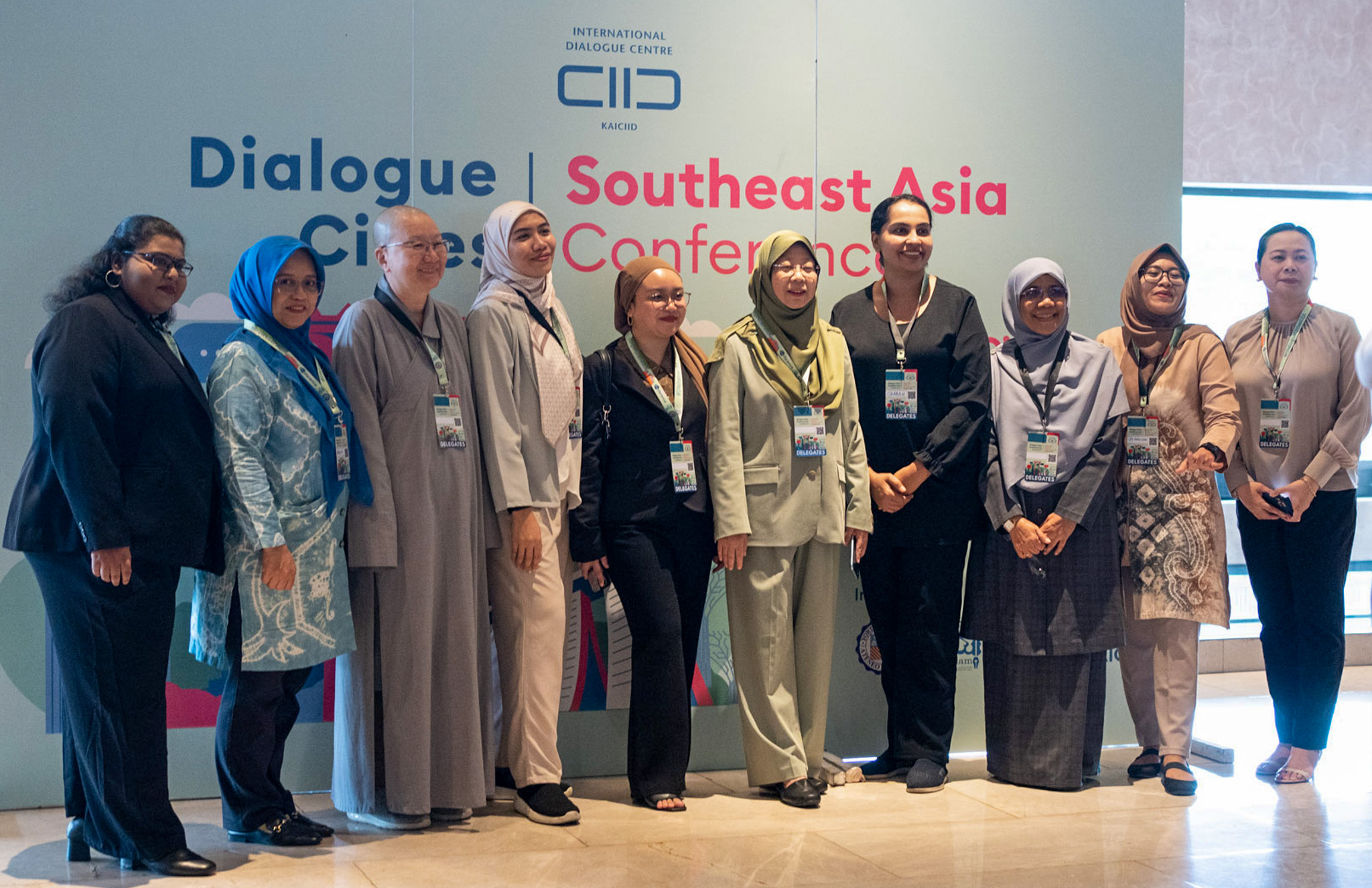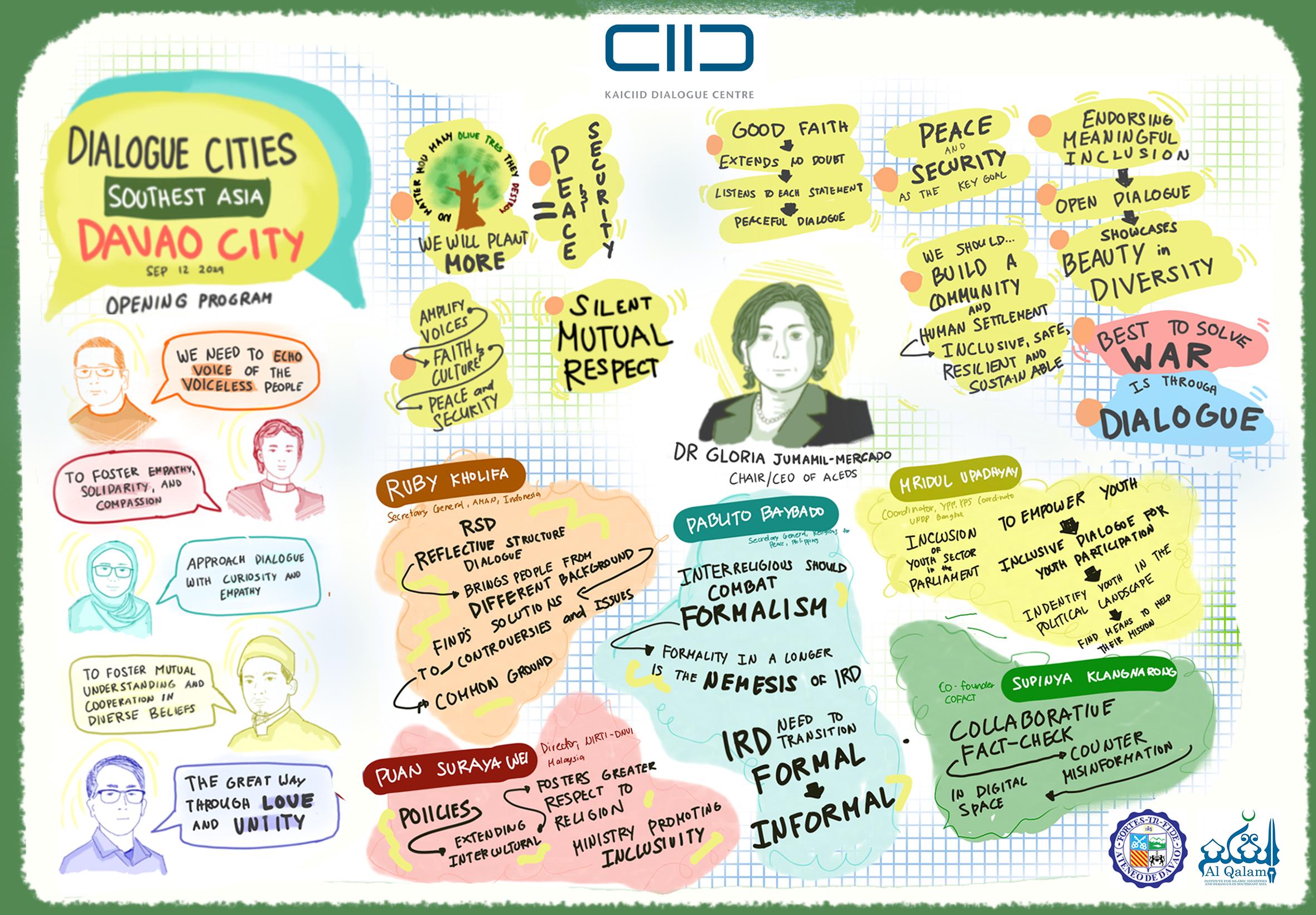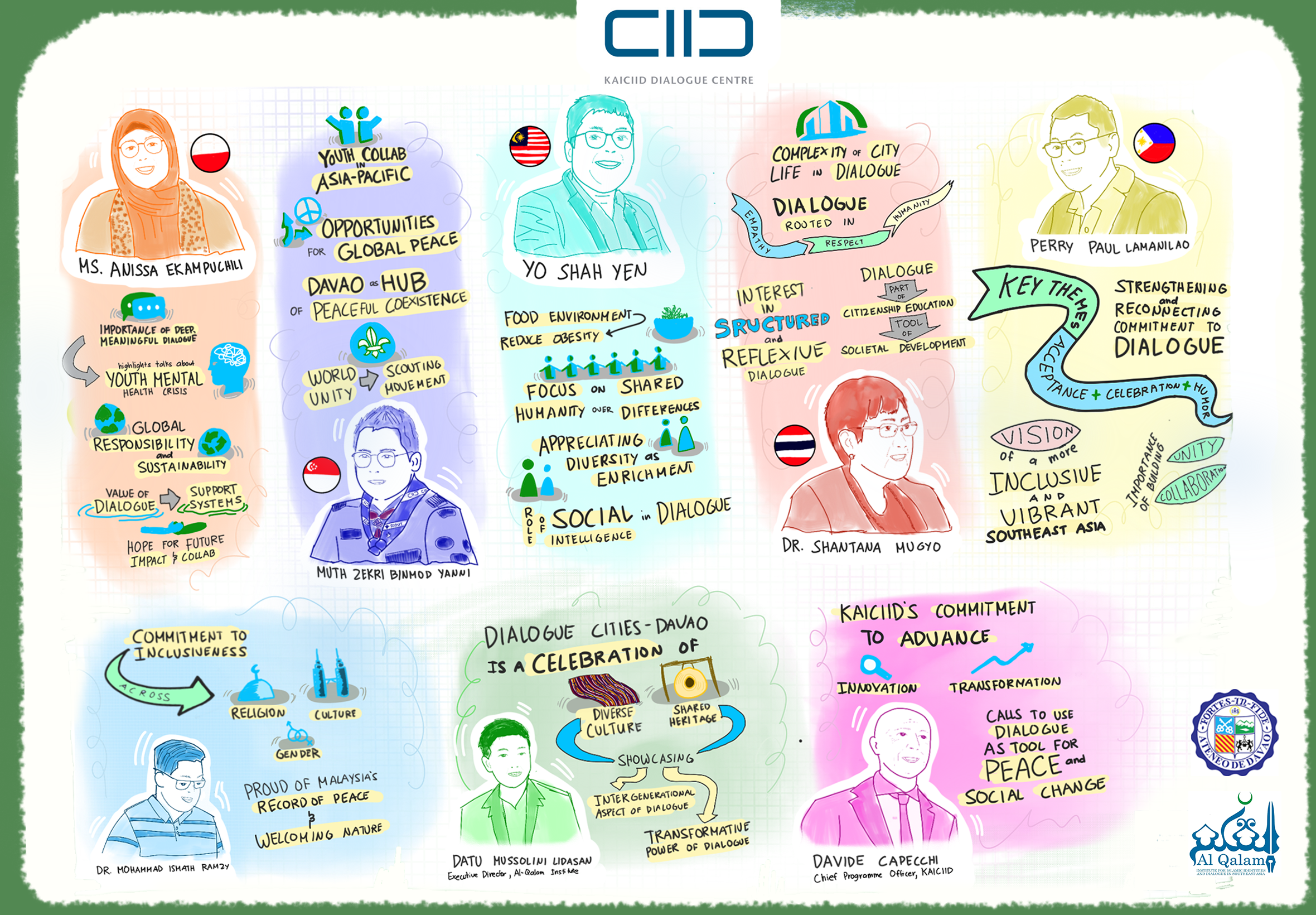
Women from Sikhism, Islam, Buddhism, and Catholicism came together, united by both their shared values and the unique challenges they face—ready to discuss their roles in driving change. They recognized the power they hold, despite often being undervalued, underestimated, and overly judged. The next morning, these women reconvened to brainstorm collaborative solutions to their common struggles. In another dialogue room, a diverse, multi-faith group focused on addressing the specific issues young people face, while a third team engaged on how innovation can bridge research gaps and foster engagement in interreligious dialogue (IRD).
This was a glimpse of Dialogue Cities Southeast Asia Conference, held in Davao, Philippines from 12 to 14 September, organized by the International Dialogue Centre – KAICIID in collaboration with Ateneo de Davao University’s Al-Qalam Institute. More than 75 participants from various faiths from across Southeast Asia, particularly from Kuala Lumpur, Bangkok, Singapore, Yogyakarta, and Davao gathered for the second edition of the conference. KAICIID’s leadership in promoting interreligious and intercultural dialogue for inclusive cities in the region played a crucial role in shaping these initiatives.
The United Nations reports that more than 50% of Southeast Asia's population currently resides in urban areas, a figure expected to rise to 70% by 2050 as increasing numbers of young people seek educational and economic opportunities. While this urban growth presents new opportunities, it also poses significant challenges. Addressing these challenges will require the involvement of interfaith facilitators to promote social cohesion, uniting the efforts of city policymakers, civil society leaders, and religious actors.
Launched in Bangkok in 2023, the Dialogue Cities Southeast Asia initiative fosters multi-sector collaborations to build inclusive, sustainable cities. It serves as a platform for sharing knowledge and best practices, emphasizing interreligious and intercultural dialogue (IRD and ICD) as tools for addressing local development challenges. The second event, held in Davao, highlighted the importance of empowering women and youth, ensuring their voices shape inclusive urban development. Through these efforts, KAICIID is driving meaningful change at the intersection of faith, community, and development.

This conference is a clear demonstration of our collective dedication to advancing and promoting cultural dialogue, which serves as a bridge connecting various cultures, traditions, and perspectives, fostering more inclusive and peaceful communities," stated Dr. Trisha Ann Jasmin Villafuerte, local councilor, as she delivered the welcome remarks on behalf of Davao City Mayor Sebastian Z. Duterte. "We are united in our goal to encourage dialogue, mutual understanding, and collaboration across our cities.
Both on stage and in informal discussions, attendees shared their observations on how urbanisation is affecting social cohesion.
Benjie Maynopas, a youth representative from Davao City’s Foursquare Gospel Church, highlighted how cities provide significantly better access to the Internet compared to the islands of archipelagic countries like Indonesia or the Philippines. As more individuals migrate to urban areas, their exposure to online information increases, but so does the risk of misinformation, which Maynopas identifies as a major challenge facing today’s youth. "Social media presents different perspectives and ideas, which often leads to confusion about their identity," he explained.
In Kuala Lumpur, known for its diverse religious and cultural landscape, Dr. Charanjit Kaur, Assistant Professor at University Tunku Abdul Rahman, highlighted how classifying individuals based on race or religion often marginalizes minority groups like the Sikhs. This practice can result in certain religious communities being overlooked by city authorities when designing initiatives, leading to exclusion and inequities. "Without proper allocations, their needs are ignored," Kaur stated, pointing out that in Malaysia, individuals not adhering to major religions such as Islam, Buddhism, Hinduism, or Christianity are frequently labeled as "non-religious." She expressed her frustration, noting that as a devout Sikh, she finds this classification offensive, as it oversimplifies minority identities into a single category, which further exacerbates inequities.
Other pressing challenges, such as the effects of climate change in urban areas, the increasing prevalence of mental health challenges and homelessness, as well as ongoing gender discrimination, were also frequently mentioned. However, the prevailing sentiment among attendees was that bridging religious divides through interreligious dialogue (IRD) could play a pivotal role in addressing these issues.
Benjie Maynopas highlighted how IRD can help the youth navigate misinformation, while Sheikh Abdulrahman Caderao from Davao emphasized its potential to reduce misconceptions about other faiths. "Through open, respectful conversations, we foster a more cohesive society," he noted. Dr. Charanjit Kaur further shared how IRD could assist in addressing challenges related to inclusion, especially in diverse urban environments.
In Yogyakarta, Reverend Kristi has championed building strong relationships and understandings of women through the interfaith women’s group Srikandi Lintas Iman. In doing so, she has facilitated visits to various places of worship have helped build strong relationships and understanding across different faiths.
This spirit of interfaith connection was mirrored at the Davao conference, where participants visited Long Hua Temple, San Pedro Cathedral, City Hall, City Council and Kadayawan Tribal Village. These visits came to an end at the Ateneo de Davao University where attendees engaged in informal dialogue about Al Qalam institute’s Catholic-Muslim roots, reinforcing the power of shared experiences to build bridges and deepen mutual respect—just as Reverend Kristi’s efforts have done in Yogyakarta.

The conference concluded after thematic dialogue sessions explored the untapped potential of IRD and intercultural dialogue (ICD). The youth group focused on strengthening the Southeast Asian Youth for Humanity (SEA Y4H) network, proposing an annual ceremony to recognize young leaders who advocate and initiate activities on IRD/ICD and the creation of a magazine to highlight such efforts.
The women’s group proposed facilitating connections between religious leaders and local governments for peace-building and creating training programs on digital literacy and mental health for women, ensuring equal access to opportunities traditionally dominated by men.
The research and innovation group advocated for a "5Cs" approach: collaboration with local media to promote IRD, connecting different generations, creating city arts projects to promote inclusivity, finding commonalities within spirituality across religions, and focusing on environmental conservation. "We cannot engage in IRD if we don’t have a planet to live on," said facilitator Romeo Cabarde, who emphasized the urgent need to address climate change
KAICIID, as the convenor, expressed its commitment to becoming a partner in advancing these solutions, particularly as it expands its interfaith and intercultural dialogue programmes in Southeast Asia. Asia’s Senior Programme Manager at KAICIID, Ms. Mitra Modaressi, emphasized the importance of tailoring support to the unique geographical context of the region. "We are here to listen to your challenges, and support building a supportive environment where solutions can emerge through dialogue initiatives” she said.
Looking Ahead
KAICIID will support the development of relevant proposals based on the organization’s priorities and resources to shape them into inter-city initiatives over the next year. The hope is that by the third event in 2026, to be held in Kuala Lumpur, concrete actions will be underway, with results to showcase. "Let’s spend the next year working together to find new ways of using IRD/ICD as a tool for the development challenges of the region. " Modaressi encouraged attendees.